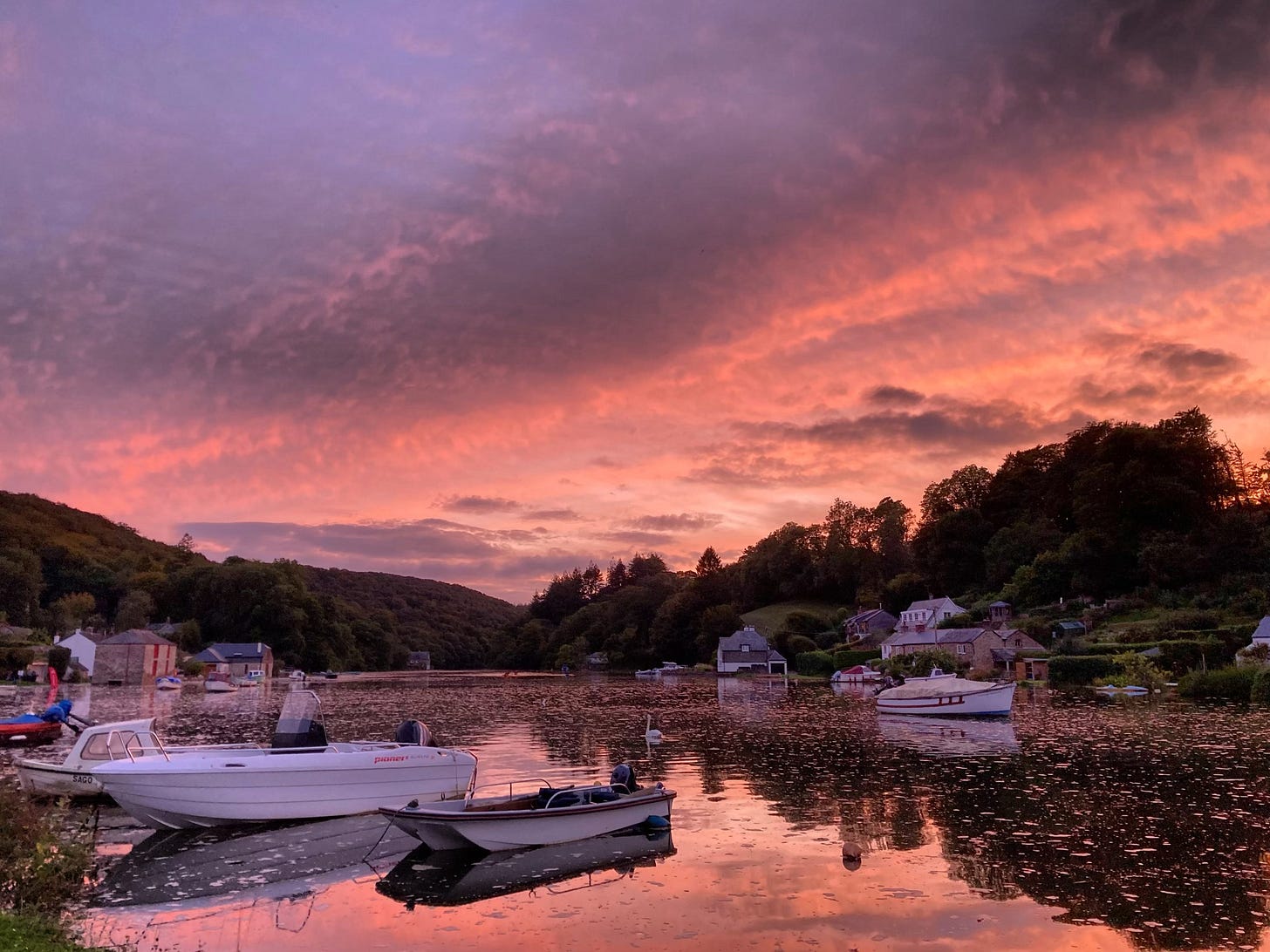The creek crept up and spilled into the village the other day, just like it did exactly a year ago, shortly before we moved here. In the car park, a swan sailed serenely past a stupidly large marooned car, and the advancing pink dusk, reflected in all this water, made you feel like you were existing inside a shrinking bubble of air between all the beauty that might soon drown you. Cornwall, being a place where the moon’s gravitational pull is weak, has some of the highest tides on earth, especially in September, when its orbit moves towards its quadrature. The following evening, at around the same time, I went to my favourite cove and the water stood taller than I’d ever seen it. As I swam I looked down in wonder at pugnacious high rocks I’d often climbed, which were now fifteen feet below me. Fish from all around the world had apparently heard the news and timed their arrival perfectly. I have never in my life seen so many while swimming in the sea in the UK and doubt I will again. One especially plump one looked me curiously in the face with a big sad Disney eye and I wanted to denounce my pescatarian past there and then, maybe even pop a hairshirt on to prove just how guilty I felt. Meanwhile a thousand of its tiny contemporaries turned themselves into a giant predator and encircled me with their curving body. “This is actually happening,” I thought. “I am being waterstrangled by a big fake shark.” I’d have giggled girlishly if not for the fact that it would have put me in danger of choking and I was 100 or so yards out from the shore. I felt like the aquatic version of Lorraine Bracco in Goodfellas during the wedding scene where all the mobsters bring her bags of money as gifts: I knew stuff like this happened, but thought it was only to other people, not me.
The cove, which is actually a sort of double cove, has innumerable moods, and this was perhaps the most uninhibited of them, the most hysterically unBritish. But there have been other very dramatic ones too. The one where I jumped in from high rocks and was flipped upside down by the force with which I hit the water. The one where I somehow morphed into a butter knife and swam through a narrow corridor of compass jellyfish, miraculously unstung. The one where a giant wave came out of nowhere and dashed me against an unseen granite peak, slicing off a tiny section of my left nipple. The one where the sun vanished behind the cliffs and a dark ghostly shape appeared in the waves, a few feet in front of me, and I reared up in terror, mid-breaststroke. Getting to knowing the cove in all its states, which I’ve come to, over the last year, is to see a small civilisation repeatedly drowned and uncovered. With every high tide, the water has a different personality: often weed-trashed, in many different ways, sometimes miraculously clear and green. On those clear green days, under a hot blue sky, there are few places in the United Kingdom that look less like the United Kingdom, and one of the central delights of those days is that they have a way of making you forget the hard facts of how few of them exist in the average year.
It was those days, primarily, that I had in mind at the beginning of autumn last year, when I considered purchasing a tiny boat I couldn’t afford from a man who lives in the village. I would rehearse the route I would take at its helm, down the creek, onto the bigger creek, out into Fowey harbour, then around to the cove. The village is called Lerryn and provided some of the inspiration for Kenneth Grahame’s The Wind In The Willows. Grahame stayed in nearby Fowey in 1907 - the year before the book’s publication - and began to write the opening chapter directly after an exploration of the River Lerryn and its surrounding woodland. If you Google “Lerryn”, you will find that this is the thing the place is most famous for, jointly with the fact that in the early years of this century the kazoo player from Mungo Jerry, composers of the noxious 1970 drunk driver anthem ‘In The Summertime’, was involved in a highly publicised altercation in the village’s sole pub after his former girlfriend moved in with the landlord. This is where Google is useful, since, in the version of the latter event that was described to us by our neighbours Bob and Philippa, as they’d heard it via the local grapevine, the pub landlord’s girlfriend had been stolen by Mungo Jerry, who Bob and Philippa had been led to believe was not a band but one prominently sideburned human man.
Keep reading with a 7-day free trial
Subscribe to The Villager to keep reading this post and get 7 days of free access to the full post archives.





